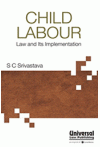- Author(s): S.C.Srivastava
- Publisher: Universal LexisNexis
- Edition: 1 Ed 2016
- ISBN 13 9789350358375
- Approx. Pages 212 + Contents
- Format Paperback
- Approx. Product Size 24 x 16 cms
- Delivery Time 3-5 working days (within Kerala & South India) (Others 7-9 days)
- Shipping Charge Extra (see Shopping Cart)
.............................................................................................................................................................................................................
Description
Today's children constitute tomorrow's future. However, it is a matter of grave concern that in India despite the constitutional mandate and statutory measures, a good number of children are denied their basic rights and opportunities and thereby they are deprived from childhood. What is disturbing is that despite making right to education and more particularly right of children to free and compulsory education a fundamental right followed by the enactment of the Right of Children to Free and Compulsory Education Act, 2009 (RTE Act, 2009) most of the children particularly in rural areas and even those who are below poverty line are not in schools. Instead they are compelled to work because of their poverty, ignorance, illiteracy, lack of social security, health facilities and, among others, food security. It is in this context that in 2013, the ILO World Report on child labour observed that "child labour can compromise the productive capacity of workers during adulthood and thereby contain both national and economic growth and efforts to reduce poverty". Be that as it may, in addition to legislative reforms, there is a need to vigorously implement the law dealing with child labour. Moreover, in order to monitor convergence of service, social accountability and people's participation are sine qua non. We now take up issues concerning the prohibition of employment of child labour. Apart from various constitutional provisions, the key Act which deals with the offense of child labour is "Child Labour (Prohibition and Regulation) Act, 1986" (CLPR Act). However, this Act prior to 2016 prohibited employment of children in 18 occupations and 65 processes. It took two decades to prohibit employment of children in all occupations and processes. Even so CLPR Amendment Act, 2016 too has made some exceptions. But this amended Act has inserted a new Section 3A which prohibits employment of adolescents in the age group of 14 to 18 in any hazardous occupations and processes specified in the new Schedule. But even the 2016 amendment has not, on the whole, delivered the goods.
.............................................................................................................................................................................................................
Contents
Part - I : Child Labour : Emerging issues & Review of Law & Policy
Chapter 1 : Introduction
Chapter 2 : Historical Background and Present Scope pf the Child Labour Legislation in India
Chapter 3 : International Prespective
Chapter 4 : Constitutional Persprective on Child labour
Chapter 5 : National policy for Child Labour and National Child Labour Project
Chapter 6 : Constitution of Indian Judiciary to Safeguard the Interest of Child Labour
Part - II : Free and Compulsory Education of Children
Chapter 7 : Free and Compulsory Education of Children
Chapter 8 : Enforcement of the Right of Children to Free and Compulsory Education Act
Part - III : Child labour Prohibition and Regulation
Chapter 9 : Child labour Prohibition and Regulation Act
Chapter 10 : Administration and Enforcement of the Child Labour (prohibition and Regulation) Act
Part - IV : Ilo Convention No. 182 on the Worst Forms of Child Labour in the Indian Perspective
Chapter 11 : Introduction
Chapter 12 : Contextual Framework
Chapter 13 : Worst Forms of Child Labour
Chapter 14 : Clause of the ILO Convention
Chapter 15 : ILO Convention 182 Paragraph
Chapter 16 : ILO Convention
Chapter 17 : ILO Convention
Part - V : Conclusions and Recommendations
Chapter 18 : Conclusions and Recommendations
.............................................................................................................................................................................................................
Author Details
Professor SC Srivastava, obtained his LL.D. (Doctor of Laws) from the Calcutta University, and incidentally, the first LL.D. in Labour Law in India. Starting his career as Lecturer in Law School, Banaras Hindu University, he served Jammu University as Associate Professor (Reader) and Kurukshetra University, as Professor of Law, Chairman, Department of Law and Dean, Faculty of Law. Earlier during 1986-88, he served the University of Calabar (Nigeria) as Professor; Head of the Department of Public and International Law and Dean, Faculty of Law. He also served the Law Commission of India during 1992-97, Research Professor, Indian Law Institute, New Delhi from 1999-2004 and Director, Institute of Industrial Relations and Personal Management, New Delhi from 2004-2008. He was awarded rare distinction of Nation Fellow/National Professor from the University Grants Commission, New Delhi.

